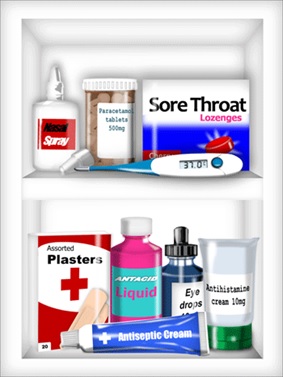 Do you need to be seen?
Do you need to be seen?
A lot of common illnesses and ailments do not have a cure and they will improve with time. Simple remedies available without prescription may help you. Please do not expect your Doctor to prescribe a drug for a minor illness. Discussion and advice may be far more useful and free from side effects. We feel it is important that all households should keep a reasonably stocked medical cabinet at home to deal with minor ailments. Remember all medicines should be stored in a box or cupboard with a lock and be kept well out of the reach of children. Check with the Pharmacist whether any over-the-counter drugs should not be taken alongside other pills or with certain conditions e.g. with high blood pressure or if pregnant. Always check the expiry date on medicines.
Pain relief
Painkillers such as aspirin, paracetamol and ibuprofen are highly effective at relieving most minor aches and pains, such as headaches and menstrual pain. Aspirin must not be given to children under 16. These medicines also help with some minor ailments, such as the common cold, by reducing aches, pain and high temperatures. These three medicines also help reduce the inflammation seen in arthritis and sprains.
Antihistamines
These are useful for dealing with allergies and insect bites. They can come in the form of creams you apply to the skin (topical antihistamine) or tablets you swallow (oral antihistamine). Antihistamine creams soothe insect stings and bites, and rashes and itching from stinging nettles. Antihistamine tablets help control hay fever symptoms and calm minor allergic reactions to food. They can also help calm itchiness during chickenpox. Some antihistamines may cause drowsiness; ask your Pharmacist about this as there are others that do not.
Oral rehydration salts
Fever, diarrhoea and vomiting make us lose water and essential minerals, and can lead to dehydration. If you have these symptoms and cannot continue your normal diet, oral rehydration salts can help restore your body's natural balance of minerals and fluid, and relieve discomfort and tiredness. But they do not fight the underlying cause of your illness, such as a virus or bacteria. Rehydration salts, available at your local pharmacy, are an easy way to take in minerals and fluid, and help your recovery.
Anti-diarrhoea tablets
Diarrhoea is caused by a range of things, such as food poisoning or a stomach virus, and can happen without warning. It is a good idea to keep an anti-diarrhoea medicine at home. Anti-diarrhoeal remedies can quickly control the unpleasant symptoms of diarrhoea, although they do not deal with the underlying cause. The most common anti-diarrhoeal is loperamide (sold under the names Imodium, Arret and Diasorb, among others). It works by slowing down the action of your gut. Do not give anti-diarrhoeals to children under 12 because they may have undesirable side effects. Speak to your GP or pharmacist for advice about a child with these symptoms.
Indigestion treatment
If you have stomach ache, heartburn or trapped wind, a simple antacid will reduce stomach acidity and bring relief. Antacids come as chewable tablets, tablets that dissolve in water, or in liquid form.
Sunscreen
Keep a sun lotion of at least factor 15. Even fairly brief exposure to the sun can cause sunburn and increase your risk of skin cancer. Ensure your sunscreen provides UVA protection. You can protect yourself against the sun further by wearing a hat and sunglasses, and by avoiding the sun during the hottest part of the day, between 11am and 3pm.
How your pharmacist can help
Don't forget your local pharmacist can help with many ailments; they can give advice or, where appropriate, medicines that can help clear up the problem. Your pharmacist may be able to help with:
- skin conditions, such as mild acne and mild eczema
- coughs and colds, including nasal congestion and sore throat
- minor cuts and bruises
- constipation and haemorrhoids (piles)
- hay fever and allergies
- aches and pains, such as headaches, earache and back pain
- indigestion, diarrhoea and threadworms
- period pain and thrush
- warts and verrucas, mouth ulcers and cold sores
- athlete's foot
- nappy rash and teething
 Your first aid kit
Your first aid kit
As well as the medicines discussed earlier, keep a well-prepared first aid kit. This can help treat minor cuts, sprains and bruises, and reduce the risk of cuts becoming infected. It should contain the following items:
- bandages – these can support injured limbs, such as a sprained wrist, and also apply direct pressure to larger cuts before being treated in hospital
- plasters – a range of sizes, waterproof if possible
- thermometer – digital thermometers that you put in your mouth produce very accurate readings; a thermometer placed under the arm is a good way to read a baby or young child's temperature
- antiseptic – this can be used to clean cuts before they are dressed (bandaged) and most can treat a range of conditions, including insect stings, ulcers and pimples
- eyewash solution – this will help wash out grit or dirt in the eyes
- sterile dressings – larger injuries should be covered with a sterile dressing to prevent infection until treatment can be given by a health professional
- medical tape – this is used to secure dressings and can also be used to tape an injured finger to an uninjured one, creating a makeshift splint
- tweezers – for taking out splinters; if splinters are left in, they can cause discomfort and become infected